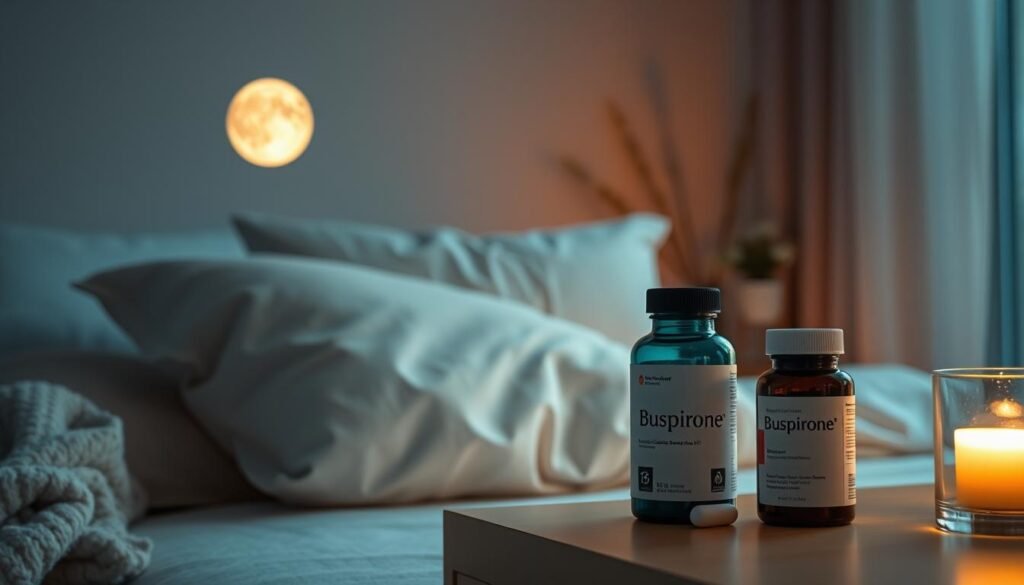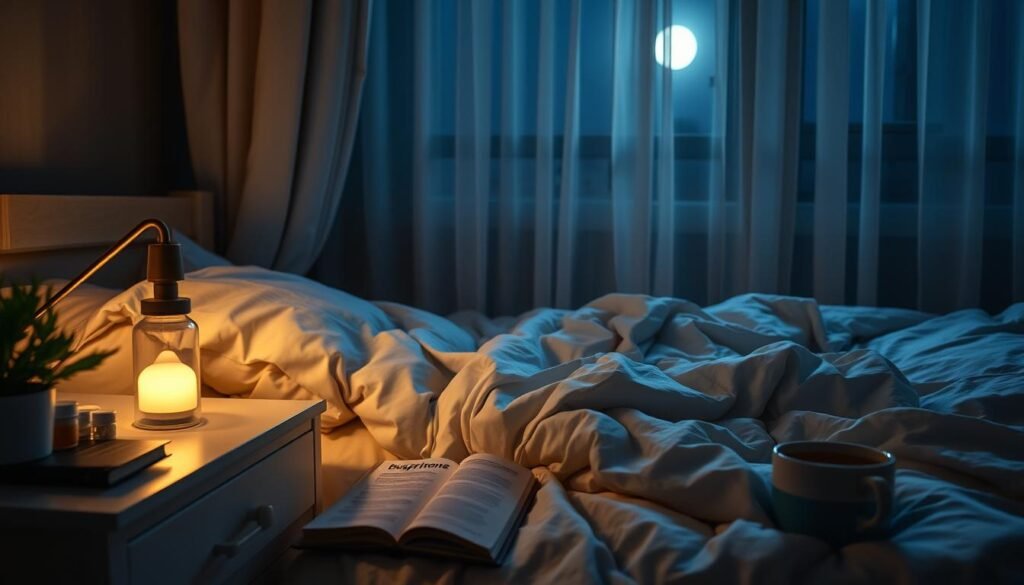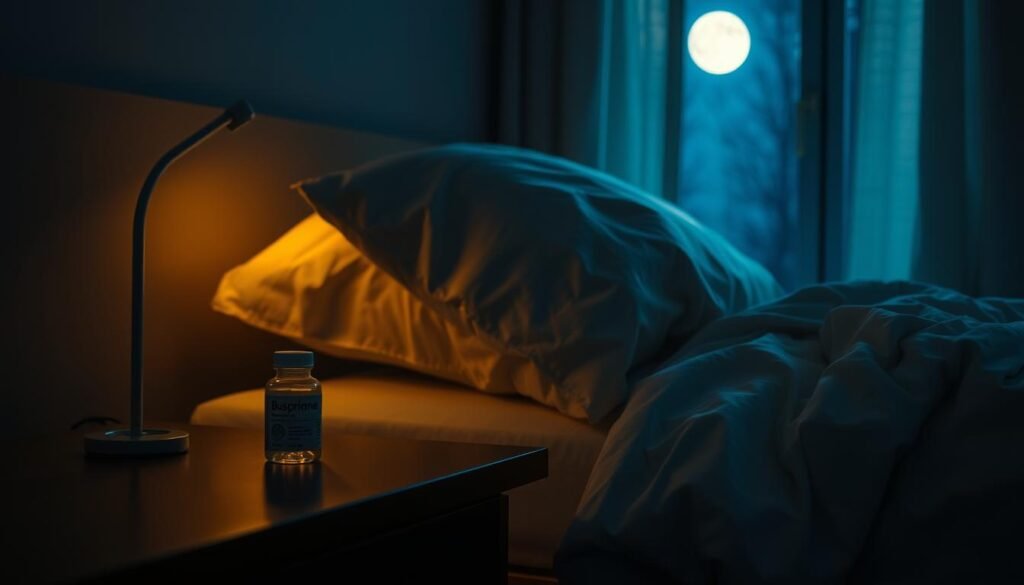Did you know that over 30% of adults report struggling with insomnia at some time? Often, this issue stems from underlying anxiety. BuSpar, or buspirone hydrochloride, is usually given for anxiety disorders like GAD. It’s also looked at for helping those with insomnia. Even though it’s not your typical sleep aid, buspirone’s knack for easing anxiety could help you sleep better.
In this piece, we’ll dig into how buspirone works and its upsides for sleep troubles. If you’re thinking about buspirone for your sleep issues, you’ll find valuable info here. Ready to tackle insomnia differently? For detailed guidance on buspirone insomnia treatment, like how much to take and safety tips, keep reading!
Key Takeaways
- Buspirone is mainly for anxiety but can also improve sleep indirectly.
- Better sleep might come from less anxiety with buspirone use.
- Though not a standard sleep drug, buspirone can aid in sleep effectively.
- Always talk to a doctor before trying buspirone for insomnia.
- Buspirone’s side effects are usually mild but need watching.
- Look into other options like cognitive behavioral therapy besides buspirone.
Understanding Buspirone: An Overview
Buspirone is known by brands like BuSpar and Buspar Dividose. It’s mainly used for anxiety disorders. Unlike common benzodiazepines, it’s an azapirone. This makes it less likely to cause dependency. Taking a closer look at buspirone helps us understand its benefits, especially for sleep issues.
What is Buspirone?
Buspirone effectively treats Generalized Anxiety Disorder (GAD). It’s great for those who can’t use selective serotonin reuptake inhibitors. It works by balancing brain chemicals dopamine and serotonin, easing anxiety. Usually, it takes 1 to 2 weeks to see a change. But, it not only reduces anxiety but might also improve sleep quality.
How Does Buspirone Work?
Buspirone acts on serotonin and dopamine receptors in the brain. It doesn’t make you sleepy like some sleep meds. Instead, it lifts your mood and lowers anxiety, which can help you sleep better. It can have side effects like drowsiness, dizziness, or sleep problems. Even with these, it’s a good option for tackling insomnia.
Buspirone and Insomnia Treatment
Buspirone, also known as Buspar, mainly targets generalized anxiety disorder. It shows promise for those with stress-related insomnia. Unlike standard sleep aids, buspirone doesn’t primarily sedate. It improves relaxation by affecting neurotransmitters like serotonin and dopamine. This helps reduce the anxiety that can prevent sleep.
Buspirone isn’t the first choice for insomnia, but it can help in certain cases. Its benefit lies in easing anxiety without causing drowsiness. This makes it good for people whose sleep issues are due to anxiety.
Taking buspirone regularly can improve your life’s quality. It usually takes weeks to see its full benefits. Sticking to a regular dose is key. Pairing it with healthy habits like exercise and stress reduction can boost sleep quality further. This offers a well-rounded solution to tackling insomnia.

Effects of Buspirone on Sleep Induction and Maintenance
Understanding how buspirone impacts sleep sheds light on its use for insomnia relief. The focus is on how it aids sleep start and continuance, while also reducing anxiety.
Research Findings on Sleep Parameters
Studies indicate that buspirone doesn’t work as a sedative. It improves sleep by easing anxiety, which is key for better sleep. One study showed that in the beginning, users might see a slight increase in wake time after sleeping.
This points to an adjustment phase; consistent buspirone use might lead to better sleep over time.
Impact on Sleep Quality Over Time
With ongoing buspirone treatment, people often experience improved sleep. Early sleep disruptions lessen as anxiety drops, leading to steadier sleep.
This continuous relief from buspirone helps maintain good sleep, offering significant benefits for those with anxiety-driven sleep issues.
Buspirone for Anxiety-Related Sleep Issues
Buspirone is an effective treatment for those struggling with sleep issues due to anxiety. It targets generalized anxiety disorder (GAD) by acting on serotonin receptors. This action helps lessen anxiety symptoms, leading to better sleep. It’s known for helping people whose insomnia stems from their anxiety challenges.
Using buspirone can help individuals feel more relaxed. This relaxation could mean better sleep quality. Experts suggest using buspirone at bedtime can especially help. A routine ensures its best performance for those facing anxiety-driven sleep problems.
Studies show buspirone’s positive effects on managing anxiety. It can significantly enhance life quality for its users. While some might experience dizziness or nausea, serious side effects are uncommon. This allows people to improve their sleep and overall well-being without much worry.
In conclusion, buspirone is a viable option for tackling anxiety-induced sleep issues. Its ability to ease anxiety and potentially improve sleep makes it an important choice in therapy today.

Benefits of Buspirone as a Sleep Aid
Buspirone is mainly used to treat anxiety but also helps with sleep. It improves sleep by reducing anxiety. This helps people have more peaceful nights.
Reduction in Anxiety Symptoms
Buspirone eases anxiety by working with serotonin receptors in the brain. It stabilizes the mind without making you drowsy like other sleep aids. As anxiety decreases, so does stress, improving sleep quality.
Regular use lessens anxiety, giving a deeper sense of peace. Studies back this up, showing real benefits for users.
Improved Sleep Quality
Buspirone at bedtime can enhance sleep quality, besides lowering anxiety. Users often enjoy more refreshing sleep. This leads to better energy and focus during the day.
Taking it nightly can normalize your sleep cycle. This supports overall well-being, especially with added lifestyle changes. For more info, check this article.

Buspirone vs. Traditional Sleep Medications
Buspirone is an interesting choice when looking at sleep aids. It stands out from common sleep meds like benzodiazepines. While people search for effective sleep disorder solutions, they also think about the negatives of usual options. This makes them look at other choices.
Comparison with Benzodiazepines
Benzodiazepines were always the first pick for insomnia. They work fast but carry big risks. Users often face sedation, addiction, and hard withdrawal. But buspirone offers a different path. It’s a *buspirone insomnia remedy* that’s safer. It works on the brain’s chemicals without the downsides of physical addiction.
Why Buspirone May Be Preferred
For those avoiding addiction, buspirone is attractive. This *buspirone sleep medication* eases anxiety and slowly betters sleep. Unlike others, it slowly builds up its effects. This means sleep improves without being knocked out right away. It’s good for calming and relaxing before sleep, making rest easier. Thanks to its role in treating sleep disorders and anxiety, buspirone is a strong, safe choice.
| Medication Type | Immediate Effects | Dependency Risk | Common Side Effects |
|---|---|---|---|
| Benzodiazepines | Quick sedation | High | Drowsiness, dizziness, confusion |
| Buspirone | Gradual anxiety relief | Low | Headache, nausea, dizziness |
To dive deeper into the subject, detailed studies like the research on buspirone’s safety and efficacy offer insights. They show buspirone’s effectiveness in managing insomnia and anxiety.
Common Side Effects of Buspirone
Buspirone is mainly used to treat anxiety. It’s a generic prescription medication with a range of potential side effects. Those using buspirone for insomnia need to know about the common and serious side effects that might occur.
Some common side effects include:
- Nausea
- Dizziness
- Headache
- Fatigue
- Confusion
- Difficulty sleeping
These effects are usually mild, but it’s important to keep an eye on them. There are also serious side effects:
- Severe allergic reactions
- Depression
- Serotonin syndrome
- Rapid heartbeat
- Uncontrolled shaking
If you experience any serious side effects, you need to seek medical help right away. Some might also notice sexual side effects or changes in weight, but these are rare.
Knowing these side effects can help you use buspirone safely for anxiety and insomnia. It’s key to observe if side effects get better or worse, as this can affect your treatment and health.
| Type of Side Effect | Examples | Severity |
|---|---|---|
| Mild | Nausea, Dizziness, Headache | Often manageable |
| Serious | Depression, Rapid heartbeat, Severe allergic reactions | Requires immediate attention |
| Rare | Weight changes, Sexual side effects | Less frequently reported |
Talking openly with your healthcare provider about side effects can make your buspirone treatment safer and more effective. Being proactive is key to handling any issues that come up.
Dosage Recommendations for Using Buspirone
Knowing the right dosage for buspirone is key for good results, especially for sleep problems. The right dose helps it work well and keeps side effects low.
Typical Dosage for Anxiety Relief
For anxiety, buspirone starts at 7.5 mg taken twice a day. Doses can go up by 5 mg every 2 to 3 days. The max dose is 60 mg a day. This slow increase helps find the best amount for each person. It aims to reduce anxiety with minimal side effects.
Adjustments for Insomnia Treatment
For sleep issues, buspirone might need dose changes. Though not officially approved for sleep problems, doctors can still prescribe it. They may tweak doses to ease night-time anxiety without too much alertness. Always talk to your doctor to get the right dose for insomnia.
| Dosage Strengths | Typical Starting Dosage | Maximum Dosage | Administration Frequency | Considerations |
|---|---|---|---|---|
| 5 mg, 7.5 mg, 10 mg, 15 mg, 30 mg | 7.5 mg twice per day | 60 mg per day | Twice daily | Consult a healthcare provider for adjustments, especially for insomnia. |
Risks and Considerations When Using Buspirone
When using buspirone for insomnia, it’s important to know the risks. Is it safe? Mostly, but people with kidney or liver disease must talk to a doctor before starting. A doctor’s guidance ensures that using buspirone is safer.
Buspirone may not work well with some other drugs, especially MAOIs. These combinations can lead to harmful effects or lower buspirone’s power. Knowing how drugs interact helps avoid complications.
Drinking grapefruit juice with buspirone can raise the drug levels in your blood. This increases side effects risk. Patients should not have this fruit unless a doctor says it’s okay.
Some people might feel dizzy, lightheaded, or drowsy from buspirone. These symptoms can make daily tasks harder. Not everyone will feel these, but watch out for them. Serious signs like chest pain or feeling very confused need a doctor right away.
Here’s a quick rundown on buspirone:
| Consideration | Description |
|---|---|
| Health Conditions | Talk to a doctor if you have kidney or liver problems before starting. |
| Drug Interactions | Be careful with MAOIs and other drugs. |
| Food Interactions | Don’t drink grapefruit juice to avoid more side effects. |
| Common Side Effects | Look out for dizziness, lightheadedness, drowsiness. |
| Severe Symptoms | If you feel chest pain or get confused, see a doctor right away. |
Conclusion
Buspirone stands out as a key choice for managing insomnia, especially when linked to anxiety. It’s been around for about 30 years, approved for generalized anxiety disorder (GAD). This makes buspirone a safer, long-term option unlike traditional benzodiazepines. It tackles the root anxiety issues, helping many find relief from insomnia.
This leads to improved sleep quality and overall well-being.
Though not a typical sleep aid, buspirone’s success in reducing anxiety helps people sleep better. Studies show that its consistent use gives results similar to benzodiazepines for GAD treatment. It’s very useful for those who haven’t used benzodiazepines before.
Deciding to use buspirone for insomnia means talking deeply with your healthcare provider. Working together on a personal treatment plan boosts your chances of managing insomnia well. This approach aims for more than just good sleep. It’s about improving your emotional health too.